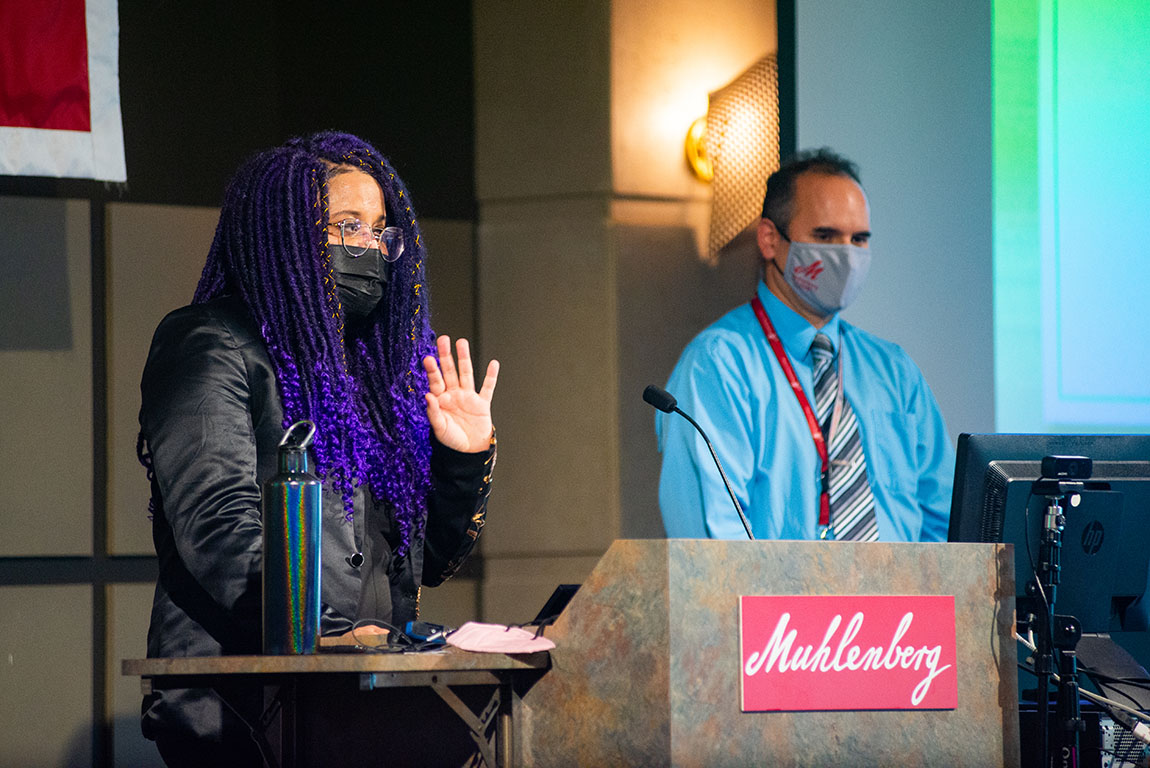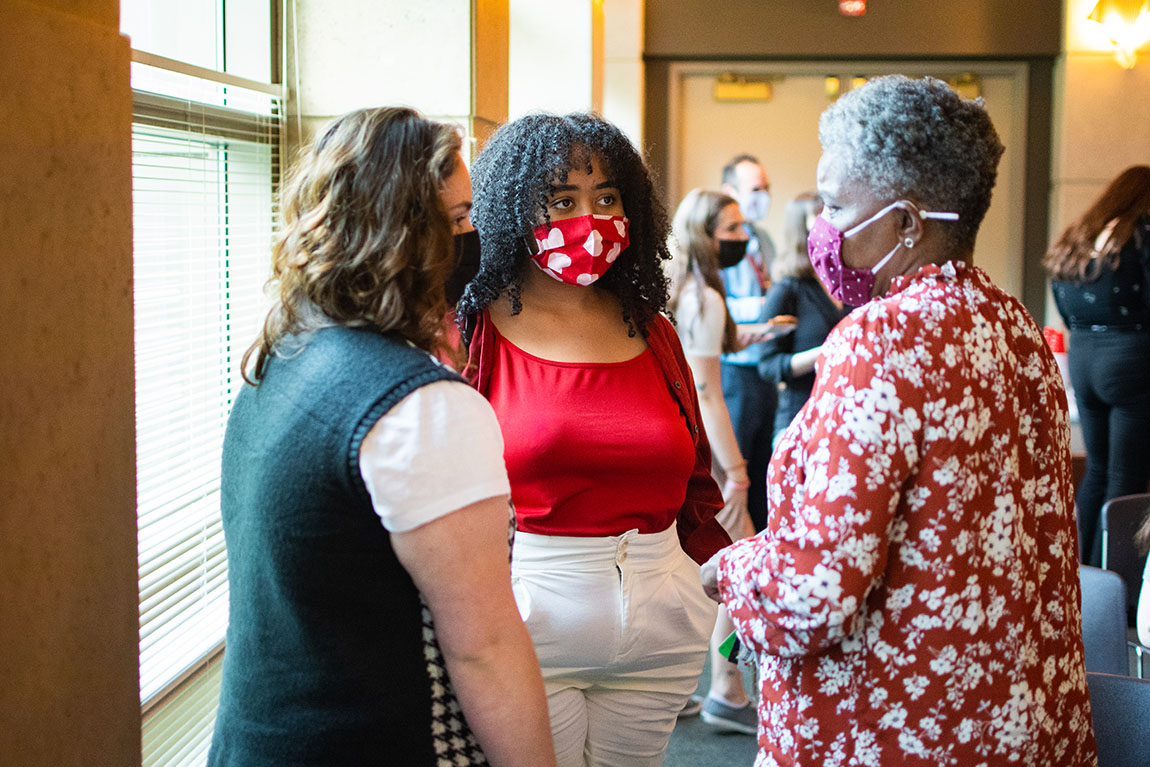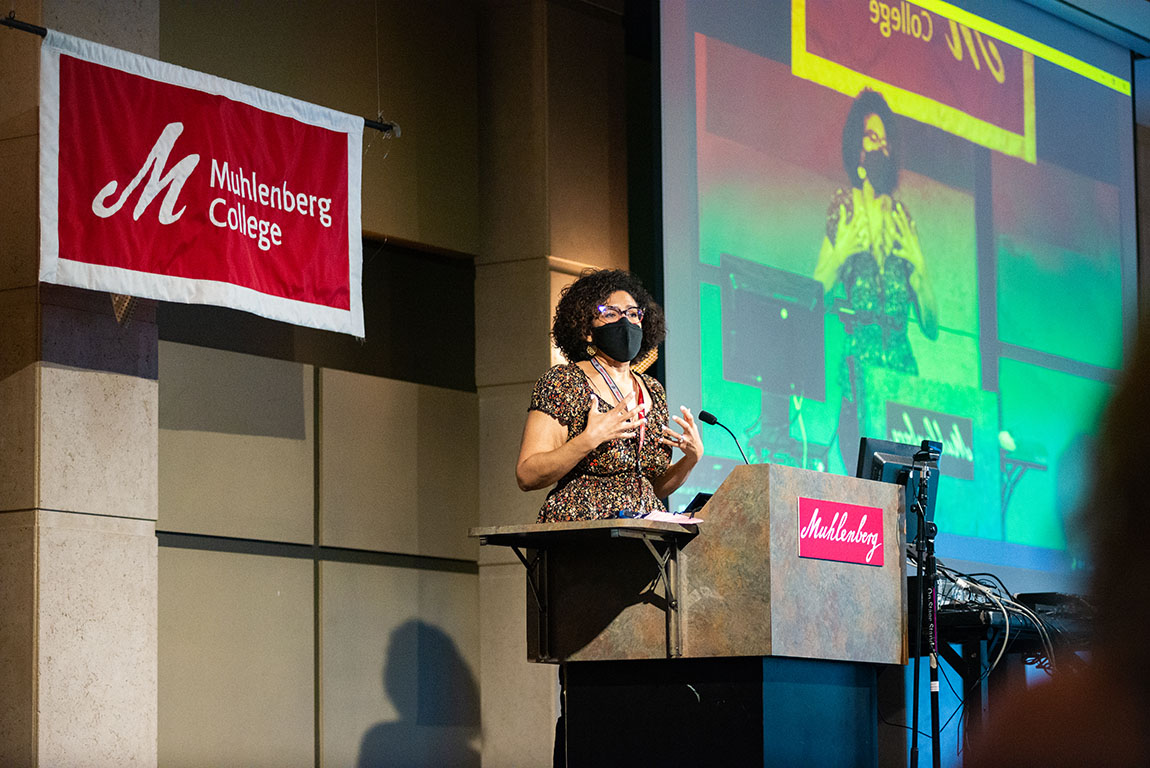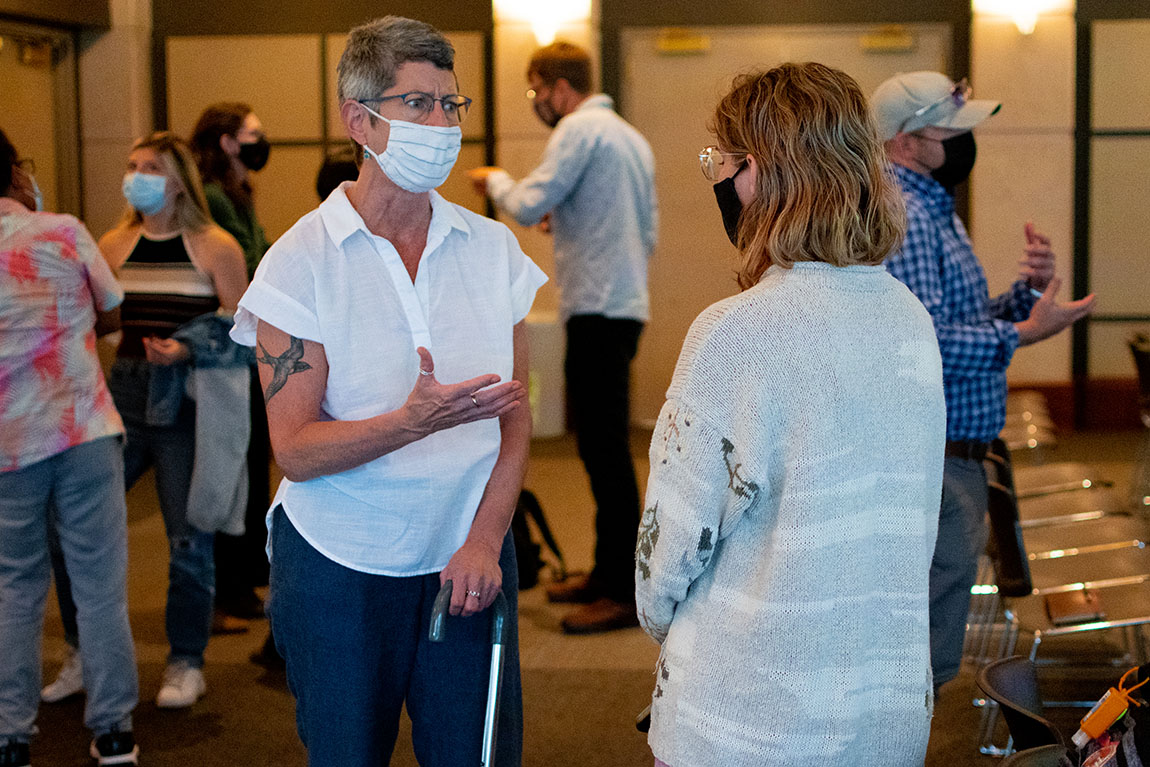Helping Students From Underrepresented Backgrounds Consider Grad School
A new program offers workshops, resources and—most importantly—mentorship for students and recent alumni in all fields of study.By: Meghan Kita Thursday, October 28, 2021 10:20 AM
 Assistant Professor of English and Africana Studies and Co-Director of Africana Studies Emanuela Kucik and Assistant Professor of Biology Giancarlo Cuadra speak at the September launch event for the Graduate School Preparatory Program for Students from Underrepresented Backgrounds. Photos by Joe Romano ’23
Assistant Professor of English and Africana Studies and Co-Director of Africana Studies Emanuela Kucik and Assistant Professor of Biology Giancarlo Cuadra speak at the September launch event for the Graduate School Preparatory Program for Students from Underrepresented Backgrounds. Photos by Joe Romano ’23Alexandra Caban-Echevarria ’23 applied for the new Graduate School Preparatory Program for Students from Underrepresented Backgrounds (GSPP) last spring, as a sophomore. The prep work she’s been doing is the kind that needs to happen before you study for standardized tests or start crafting a personal statement.
“When I signed up for the program, I had like five areas of interest,” says Caban-Echevarria, a media & communication and English double major with a minor in art history. “This semester, just by talking to [my advisor and mentors] only once, I’ve decided what I want to do and I’ve narrowed it down into what programs and where I want to go, at least city-wise.”
The GSPP’s goal is “to promote equity, diversity and inclusion by helping students from underrepresented backgrounds successfully apply to, complete and thrive in graduate and professional programs,” per its mission statement. The program also focuses on mental health as a key part of academic success. “Underrepresented backgrounds” is broadly defined to include students of color, LGBTQ+ students, students with disabilities, first-generation students, students whose identities are underrepresented in their field of study (for example, women in STEM) and students from other groups that are underrepresented in higher education. It welcomes students at all stages of the grad-school process; the first cohort, this fall’s, includes five recent alumni, nine seniors, 14 juniors and four sophomores.
The program’s co-founders and co-directors, Assistant Professor of English and Africana Studies and Co-Director of Africana Studies Emanuela Kucik and Assistant Professor of Biology Giancarlo Cuadra, hoped to draw more than just seniors: “We’re really thrilled with how many students have signed up who aren’t sure if they want to do grad school or what they want to study, because we want those students to know that there are people who can help them navigate those questions,” Kucik says. “This isn’t a program only for people who have it all figured out.”

GSPP participants were able to meet each other as well as the committee of faculty and staff advisors and mentors at the September launch event.
A Partnership and a Program
Shortly after Kucik started at Muhlenberg, several students approached her with questions about applying to grad school. She had just completed her Ph.D. at Princeton University before joining the College in 2018, so she’d recently been through the process herself. She was happy to help the students individually, but she quickly realized that their questions overlapped. She met with Associate Provost of Faculty & Diversity Initiatives Brooke Vick to discuss creating a program to help a cohort of students simultaneously, and, with Vick’s encouragement and support, she decided to plan a Grad School Night event in Spring 2020 to gauge interest.
When the email about the event went out to faculty, staff and students, Cuadra contacted Kucik. It turned out that both of them had envisioned building a program to help underrepresented students navigate grad school. The same conversations Kucik had been having with students in the humanities, Cuadra had been having with students in the sciences. They decided to work together.
The pandemic forced Grad School Night to move to Fall 2020, and then, it was held virtually, but more than 50 students and alumni tuned in or requested a recording. Clearly, the interest was there, so Kucik and Cuadra accelerated their plans to create a long-lasting program for students from underrepresented backgrounds in all disciplines.
The duo announced the launch of the GSPP (which is jointly housed in the Africana Studies Program, the Career Center and the Office of Multicultural Life) this past spring. Students could apply for the program running this academic year in Spring 2021. The application was a series of open-ended essay questions meant to help students articulate what they hoped to get out of the program and grad school and to give Kucik and Cuadra an understanding of the students, their interests and their goals.
Meanwhile, Kucik and Cuadra were also recruiting colleagues to volunteer for the program’s Faculty, Staff and Administration Committee. Professor of Biology and Co-Director of Biochemistry Amy Hark was one of about 40 faculty, staff and administrators to join the group: “Even with the agency and benefits I was fortunate to have, when trying to figure out how to consider graduate or professional school when I was an undergrad, I felt like I was swimming in cloudy water,” she says. “The process is opaque, and I want to be helpful.”

Vick speaking at the September launch event
Building Skills and Connections
GSPP has three main components. The first, Kucik describes as “skill- and community-building.” This takes place through graduate school application skill-development workshops put on by the Career Center, GSPP committee members and volunteers from across campus. So far, these workshops have included topics such as time management, crafting a personal statement and building a resume/CV. Students attend these workshops as a cohort, which lends to community-building.
GSPP events were designed with student interests in mind: For example, a survey that all students took upon admission to the program indicated a desire for programming on diversity, equity and inclusion. At the launch event on September 15, Vick spoke about navigating difficult situations related to diversity, equity and inclusion and graduate school. Vick’s message, especially what she had to say about “imposter syndrome,” resonated with Caban-Echevarria: “I’d never heard that before. It means you don’t think you’re supposed to be here. That’s something I’ve been going through lately. When she said that, I realized it’s okay to feel like that and no, I’m wrong: I should be here. I am good enough. She made me feel like it’s okay to be scared and not know what the future holds.”
The second component is advising and mentoring. Kucik and Cuadra wanted each student to have at least one faculty or staff advisor in their desired field of study and at least one mentor from the underrepresented group with which the student identifies. In some cases, a single faculty or staff member could fill both roles, but more commonly, each student would need a separate advisor and mentor, with the advisor covering the application process in the student’s field and the mentor answering identity-based questions students might have about being in that field. Figuring out this puzzle was “a monumental task,” Cuadra says, especially because they wanted to respect their volunteers’ time and avoid giving any mentor more than two mentees. Kucik and Cuadra believe this individualized advising and mentoring component is one of the most important parts of the program.
“We are so grateful to the committee—to the people who’ve come in to do this,” Kucik says. “It’s all volunteer-based. This program would not exist without them.”
The final component of the program is peer partners. The aforementioned student survey asked, among other things, whether they wanted a peer partner in the same field, from the same underrepresented group or at the same point in the graduate school process. It was another puzzle to match each student with one or two others who wanted the same kind of partner, but it was critical: “We want to help [the students] develop bonds as they navigate this together,” Kucik says.

The September launch event was one of two major events specifically held for the GSPP cohort this semester.
Looking Ahead
This semester, GSPP students are primarily attending workshops and getting to know their mentors and peer partners. A couple more GSPP-specific events are in the works: One, in November, will have information sessions and Q&A opportunities tailored to disciplinary areas of interest (the humanities, the natural sciences, the social sciences and the arts) and a Q&A with young Muhlenberg alumni from underrepresented groups who are currently in grad school.
Another event, which will take place next semester, is a talk from a friend of Kucik’s from graduate school, Janeria Easley, a Black professor at Emory University who will discuss how she cared for her mental health while she was a first-generation, Black woman graduate student at a predominantly white institution and how she continues to prioritize mental health as a professor. (The survey also showed that many students were interested in programming about mental health, Kucik says, and this talk is one way she and Cuadra are addressing that need.)
Students in the GSPP cohort have access to a Canvas page that serves as a hub for funding information, fellowship and summer program opportunities and information sessions about various grad school programs. The GSPP website, which just launched, includes some of those resources, along with a list of the entire committee so that students can reach out to any of the committee members at any time and can expand their support network beyond their individual advisors and mentors. Students who are interested in the GSPP can also use the website to contact committee members and find out more about the program.
Both Kucik and Cuadra credit the support they received as undergraduates for their success in graduate school and beyond. Cuadra says he understands feeling like further education is out of reach because he felt that way, even about going to college—he immigrated to the United States from Peru as a high school junior who didn’t speak English.
“I know every one of our students can get into grad school given the right guidance,” he says. “As soon as the opportunity comes knocking at your door, you’ve got to take it. If you let them go by, nothing is going to change in your life and you’re going to be stagnant. That’s what I want to share: If there is a will, there is definitely a way.”
